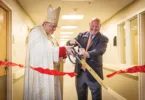by Joe Bollig
joe.bollig@theleaven.org
KANSAS CITY, Kan. — It’s not as famous as other dates, but maybe it should be: May 11, 1960.
A revolution of sorts occurred on that day, when the G.D. Searle pharmaceutical company received approval from the Food and Drug Administration to sell Enovid — the first oral contraceptive.
It became known as “the pill.”
This past spring, a variety of pundits, advocates, social critics and media outlets commented on the 50th anniversary of the advent of the pill. While some praised the introduction of oral contraceptives as an instrument of liberation for women, others pointed to a plethora of harms caused by it to individuals, families, and societies.
Nevertheless, millions of women continue to use oral contraceptives. Although there is no longer just one kind of oral contraceptive, the phrase “the pill” has stuck.
Eight years after the introduction of the pill, Pope Paul VI issued the encyclical “Humanae Vitae,” in which he outlined the church’s teaching on birth control.
“Pope Paul predicted many negative results that would affect individuals and the social structure as well,” said Msgr. Vince Krische, former director of the St. Lawrence Catholic Campus Center, Lawrence.
“[Pope Paul VI] warned that the pill would cause greater marital infidelity, divorce, family breakdown, and [the conception of] children being seen as a parent’s decision rather than as a gift from God,” he continued.
In an article that appeared in the New York Times during World Youth Day in 1993, columnist Peter Steinfels wrote that everything predicted by Pope Paul VI in “Humanae Vitae” had come true.
Doctor Robert F. Conklin, NFPMC, FCP, in an article on the Web site NFP Outreach, outlined a number of problems with oral and other contraceptives.
According to Conklin, these side effects include loss of bone mineral density, higher rates of breast cancer, blood clots, diabetes, depression and anxiety.
Beyond these, he listed the pill’s negative impact on society as a whole, contributing to a rise in sexually transmitted diseases, more out-of-wedlock births, and increasing promiscuity — with an especially detrimental affect on teens. Birth control pills have even contaminated the nation’s water supply and have deformed fish.
Ironically, oral contraceptives didn’t even successfully address the need that gave rise to them — the desire to prevent unwanted pregnancies.
In fact, after the introduction of the pill, abortions in the United States did not decrease, but dramatically increased. There have been approximately 50 million induced abortions since 1973, according to National Right to Life. That number doesn’t include the “chemical” abortions that occur through the use of contraceptives — whether they be abortifacients or not.
“Every form of hormonal contraceptive — pill, patch, implant or ring — is capable of causing an early abortion,” said Susan Wills, assistant director for education and outreach in the pro-life office of the U.S. Conference of Catholic Bishops.
“The early birth control pills contained a large dose of estrogen, and their primary effect was to block ovulation,” she said. “So, they actually were mainly contraceptive, but they caused such serious health risks to women that pharmaceutical companies constantly reduced the level of estrogen and added another hormone, progestin, which is more of an abortifacient rather than having a contraceptive effect. It changes the lining of the uterus, making it difficult for a new embryo to implant in the second week of life.”
In addition to the practical impact oral contraceptives have had on society, pastors and chaplains have observed a spiritual impact as well. The church’s teaching that artificial birth control is morally wrong has been affirmed repeatedly since Pope Paul VI’s 1968 encyclical “Humane Vitae.”
“I think a lot of what Pope Paul VI talked about in ‘Humanae Vitae’ was really prophetic, as far as the [negative] moral impact of separating love and life [through artificial contraception], and taking the procreative aspect of sexuality away from the act,” said Father Meinrad Miller, OSB, a chaplain at Benedictine College in Atchison.
In “Humanae Vitae,” Pope Paul VI wrote that there is an unbreakable connection between the unitive and procreative act in marriage — a connection that cannot be broken by humans.
The Catholic Church further teaches in the Catechism of the Catholic Church that every action — like artificial contraception — that renders procreation impossible is intrinsically evil (no. 2370).
But the church also recognizes that couples aren’t always in a position to welcome a new addition to the family. That’s why it provides couples with an alternative to artificial contraception in the form of natural family planning, or NFP.
Natural family planning could go a long way toward countering the “contraceptive mentality,” said Msgr. Krische, “if only more people knew about it.”
For almost 40 years now, Msgr. Krische has promoted natural family planning to young people preparing for marriage.
“Constantly, the comment we hear from them is, ‘No one ever told us about this before,’ or ‘Why have we never heard of this?’” he said. “They see the beauty of natural family planning and the promise it holds for building a great marriage in God’s love.”
The church’s teaching about contraception faces a skeptical culture where the contraceptive mentality has become ingrained. Nevertheless, the teaching is easily internalized once people make it part of their lives, said Father Meinrad.
“We’ve grown up in a culture that is soaked in the [contraceptive] mentality [which maintains] that this is the only way to go, and the church is living in the Middle Ages,” said Father Meinrad. “But when people discover the message of the church, I think there’s a real liberation — an ‘aha’ moment — when they sense this is something they can live with.”
This year, the U.S. bishops promoted the NFP method with Natural Family Planning Awareness Week, which ran from July 25 to 31. Not only did it coincide with the feast of Saints Joachim and Anne on July 26, but also marked the anniversary of “Humanae Vitae,” which was promulgated on July 26, 1968. The purpose of the week, according to the bishops, was to educate people about NFP methods and the church’s teaching.
There are a number of resources about NFP available on the bishops’ Web site, including liturgy and prayers, couple stories, posters, where to find NFP classes, and more. To access the site, go to http://www.usccb.org. Go to the menu on the left, click “Life Issues,” and then to “Natural Family Planning.”






